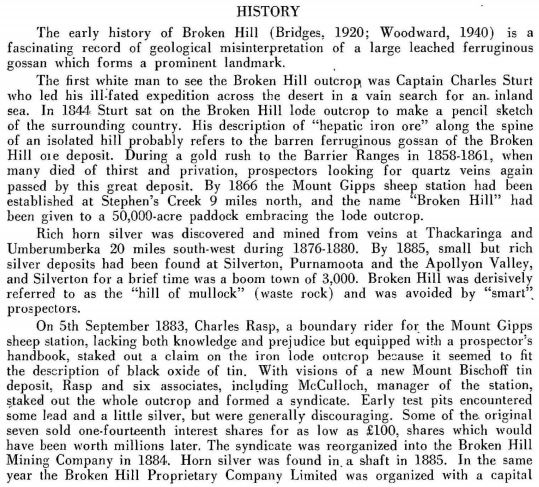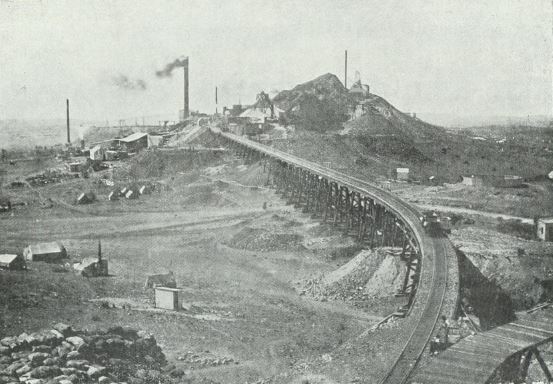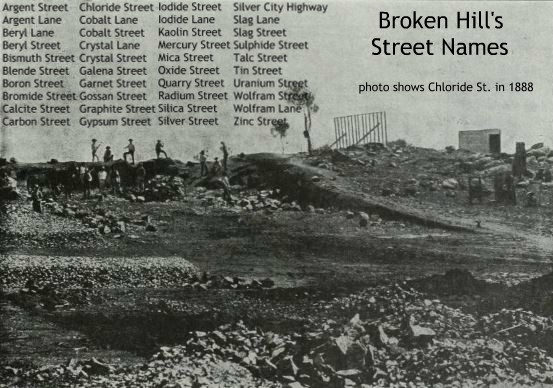|
Introduction:
A few months ago I came across the mineral aldridegeite in the IMA list of minerals whilst doing some research. This sulphate mineral is a member of the develline group first discovered and only found at Broken Hill, New South Wales, Australia.
On a hunch I asked Roger to inverstigate Mr Aldridge of Broken Hill and this is what he found out - Happy Days!
|
 A tram enters Argent St., Broken Hill.
A tram enters Argent St., Broken Hill.
At 11 o'clock in the morning, on Sunday, November 18th, 1906, an undercover police operation took place in Broken Hill, NSW, Australia. The suspected criminal was publican Howard William Aldridge, mineral collector. The place, Argent Street, next to the Duke of Cornwall Hotel. Inside the hotel, a world-class mineral collection worth over £¾ million in today’s money. Present to witness the illegal activity, and dressed in plain clothes, were Constable Blanch and Sub-Inspector Sawtell.
We’ll return to this (rather underwhelming) story a little later, after a bit about Broken Hill and Mr. Aldridge’s magnificent collection of silver, lead, zinc and copper minerals, associated with unusual gangue minerals such as bustamite, garnets and rhodonite.
 Rhodonite on galena, Broken Hill
Rhodonite on galena, Broken Hill
Australia’s Broken Hill is exceptional, both in terms of metal wealth extracted from a small area, and in terms of the diversity of wonderful specimens found there. The discovery and initial exploitation was a little shaky - In 1883 Charles Rasp pegged out the claim and formed a syndicate, but it wasn’t until 1885 when things got interesting. There were fourteen shareholders, some of whom became disillusioned with the enterprise. A couple sold their shares for as little as £100, because Rasp’s shaft was showing disappointing assays of lead and silver. Then an aboriginal worker uncovered an extremely rich deposit of silver halides. Shares sold for £150 in ‘85 became worth £1.5m a couple of years later. That’s £177m today…. One wonders if the guy who found the halides got a bonus...
Here’s the interesting history of the lode, from Geology of the Broken Hill Ore Deposit, Gustafson, Burrell & Garretty 1952 -


 Full book here.
Full book here.
At the turn of the 20th century, the Duke of Cornwall pub was being run by Howard Edward Aldridge. The miners who frequented the Duke would go there after work, straight from the diggings, and would occasionally have “bonny bits” they had found at the mine. Publican Aldridge became interested in the mineral specimens the miners took home for their mantelpieces.
Having no academic mineralogical background, Aldridge became acquainted with the various minerals and crystals from the miners; those who intimately knew the mineral realm. He started trading his beer for specimens, and the collecting bug took hold. In a big way.
As his collection grew, he gave up one of his chief balcony rooms at the pub for its display. “Teddy” Aldridge always had an eye on the worth of his collection. He’d realised he was in the right place at the right time, with the right interest (mineralogy - is there better?), running a boozer frequented by the folk at the forehead of the excavations. Aldridge had bespoke glass and wood cabinets built into his collection room, and opened it as a pub museum, which was then frequented by the families of the miners, and the general public. The miners could banter amongst themselves concerning the minerals, over an ale with the perks of their job displayed in all their beauty, whilst their families could enjoy the pub’s gardens and animals. Once the local miners saw their finds on display, rivalry and pride of discovery, and the promise of a few pints, ensured that Broken Hill workers were very careful no fine specimens were destroyed in the scramble to glean metals from the Australian outback.

Soon the miners realised that exceptionally beautiful specimens had real worth, and some of the best were sold to dealers in Sydney. Teddy Aldridge bought them back. He started paying miners for specimens in cash, since they’d realised that they couldn’t drink their value without developing an alcohol problem. Some of the larger specimens, of native silver, proustite, or bromian chlorargyrite, had “real” value in the metals market; rocks taken as perks by the miners were essentially stolen. Maybe the transactions began to take place more circumspectly; perhaps on Sundays, instead of over the bar. Aldridge kept buying. He was in a collection frenzy to produce the world’s best. He succeeded.
 “Teddy” Aldridge, front 2nd from left
“Teddy” Aldridge, front 2nd from left
The man himself was described in his obituary as, “Possessed of a strong vital temperament and a wonderful fund of satirical humor, "Teddy" went through life with a breeziness that made his presence felt no matter in what company he happened to be. His caustic wit was ever ready, and was exercised indiscriminately on friend and foe. The edge of his satire was so keen that few people cared to risk a wordy encounter with Teddy.”
He moved to Broken Hill in the mid 80s, and started collecting in 1888. His pub, mineral collection and gardens with a menagerie, were subject not only to harassment from the police, but from the unruly elements of a rough mining town. He suffered assault, five of his snakes were stolen, and one of his monkeys was poisoned with phosphorus in front of its baby. See excerpts from local newspapers.

 Goulburn Evening Penny Post, Sat 2 May 1885
Goulburn Evening Penny Post, Sat 2 May 1885
Being the man on the spot, just as the secondary minerals from the oxidised zone were being worked out, his collection was blessed by some fantastic specimens. He turned down offers of £4000 (today £466,220) for his collection in 1891, all the while keeping his silver halides covered, and displayed only on request. The museum itself was extensively covered in the local newspapers, the following extracts offer a good idea of the splendour of his collection -
Newspaper reports on the Aldridge Collection of mineral specimens at Broken Hill, from the Barrier District of New South Wales, 1892 -

The full 24 page booklet, printed in 1892 by Fiveash & Attkins on Argent St., just up the road from Aldridge’s pub, is available here. It was a grand way of promoting a collection for sale…
As a side note, the Mr. Marsh mentioned above, who helped catalogue Aldridge’s collection, first described the copper iodide mineral Marshite, example from Broken Hill below -

Eventually Teddie Aldridge sold his collection in 1909. He let it go for £7050 (>£750,000 now) to a Sydney based philanthropist, Hugh Dixon -

The Australian Museum, Sydney mentioned the acquisition in their 1962 Australian Natural History periodical -

Returning to the run-in with the cops that Aldridge had in 1906 - The appalling criminal acts were described by Sub-inspector Sawtell, at the Broken Hill Police Court, before Stipendiary Magistrate Stevenson -
This report on the proceedings, from a Broken Hill newspaper: Barrier Miner, Mon 3rd. Dec. 1906, Case Against E.W.Aldridge.
Sub-inspector Sawtell said he knew defendant's hotel - the Duke of Cornwall; at 11 o'clock in the morning, on Sunday, November 18, he was standing opposite the hotel, in company with Constable Blanch: they were both in plain clothes; just about 11 o'clock he saw an iron door in the fence open, and defendant came out onto the footpath; five men who were on the footpath went up to defendant, who passed them in through the door; three other men crossed over Argent street and spoke to defendant; while they were speaking two others joined them, and defendant let the whole five (the second lot) in; as these five men passed in an old man came out and stood speaking to defendant for a while; witness and Constable Blanch crossed over and went about 18ft. from defendant.
Defendant looked up, and as soon as he saw witness he wheeled around, rushed in the door, and slammed it; witness knocked on the door and said, "Aldridge, let me in;" he got no answer; after waiting three or four minutes witness sent Constable Blanch around to Kaolin-street, and at 15 minutes past 11 o'clock witness went around also: witness found Constable Blanch speaking to defendant through a window; witness said, "Why did you slam that door in my face?" defendant replied, "The door is my own: I can do what I like with it;" witness said, "I'll summons, you for obstructing me in the execution of my duty;" defendant said, "You have not demanded admittance into my licensed premises yet;" witness said, "Yes, I have; I waited at the gate 10 minutes and knocked several times, and you refused to open the gate."
Witness then came away; the action of defendant was deliberate, and witness believed a breach of the Liquor Act was being committed at the time; the gate through which the men passed led into a garden adjoining defendant's hotel, and that yard or garden was not separated from the hotel other than by the hotel doors; the yard or garden was used in conjunction with the hotel business. Witness, continuing, said he had every reason to believe that the yard or garden was being used in the manner mentioned on the morning of the offence.
The men were admitted into the garden; witness was informed by defendant that the garden was private property; witness had never seen any plans of the hotel premises; in the garden was a collection of specimens and a collection of birds and animals; very many people went through the garden gate on Sunday; but witness had never seen anyone go through the gate on weekdays; the gate was about 40ft. from the hotel premises; he was executing his duty as an officer under the Liquor Act; he could not say whether the men entered the hotel or not.
Constable Blanch having given corroborative evidence of a similarly bumbling nature, Stipendiary Magistrate Stevenson dismissed the case.
Full report here.
Although Broken Hill’s quality of mineralogically minded publicans is second to none, its sub-inspectors are suspect. Sub-inspector Sawtell was intent on uncovering a den of Sunday drinking, unaware that the pub’s visitors could have been loaded down with stolen silver specimens!
 Native Silver, Broken Hill
Native Silver, Broken Hill
Sunday drinking is now legal in New South Wales. Sub-inspectors have little to tax them. Nowadays, staggering out of leaving the premises of the Duke of Cornwall pub in the town of Broken Hill of a Sunday, a visiting mineralogist is blessed for memorable directions to his hotel. The pub is on the main drag, Argent Street. The name is from the french for silver. With any luck his lodging is on one of these Broken Hill streets -

Broken Hill is a mining town! Local folk still collect specimens, see here.
Here’s some further info on Broken Hill from 1908, Mines and Minerals of the British Empire, by Ralph S. G. Stokes

See also, The History of Broken Hill, Curtis 1908.

And Now for Something Completely Different
___________________